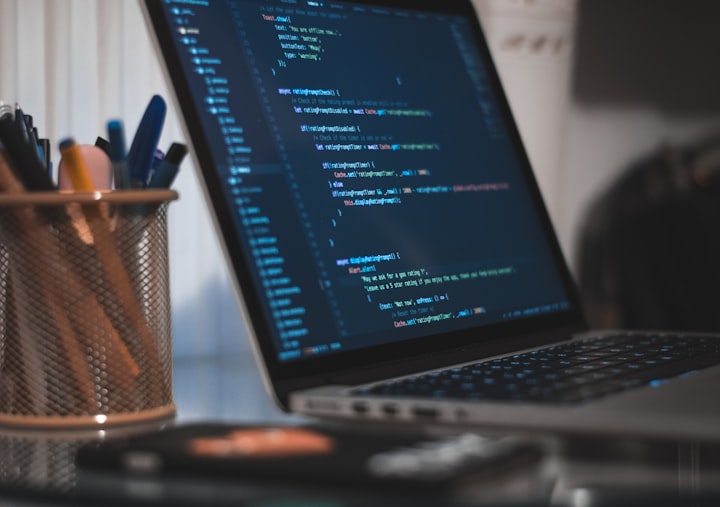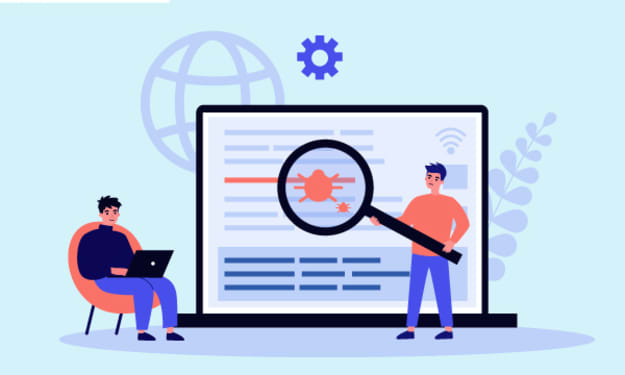"7 Steps to Becoming a Successful Programmer
From Learning the Basics to Staying Up-to-Date
Becoming a programmer is a rewarding and exciting career path, but it can also be a challenging one. Programming is an art that requires a lot of patience, dedication, and hard work to master. Whether you're interested in creating websites, mobile applications, or working with data, there are a few steps you can take to become a programmer.
1. Choose a language
The first step to becoming a programmer is choosing a language to learn. There are many programming languages out there, but some of the most popular ones include Java, Python, C++, and JavaScript. Consider your interests and what kind of programming you would like to do, and research the languages used in those fields.
popular programming languages that you may want to consider based on your interests and goals:
• Java: widely used in enterprise software development, Android app development, and web applications.
• Python: popular for data science, machine learning, web development, and scripting.
• JavaScript: essential for web development, front-end web development, and server-side programming with Node.js.
• C++: widely used in game development, operating systems, and high-performance applications.
• Swift: primarily used for developing iOS and macOS applications.
• Ruby: popular for web development and server-side scripting.
• PHP: commonly used for web development and server-side scripting.
• Kotlin: modern programming language used for developing Android applications.
• Go: designed for high-performance and scalable systems, used in cloud computing, networking, and server-side programming.
Remember, the choice of language ultimately depends on your interests, goals, and the industry you want to work in.
2. Learn the basics
Once you've chosen a language, it's time to start learning the basics. Start with the syntax, data types, and control structures of the language. This will give you a solid foundation to build upon as you learn more advanced concepts.
Learning the basics of programming is an essential step towards becoming a successful programmer. Here are some fundamental concepts that you need to learn:
1. Variables: A variable is a named memory location used to store data. In programming, variables can hold various types of data such as numbers, strings, and boolean values.
2. Data Types: In programming, data is classified into different types such as integers, floating-point numbers, characters, and strings. It's important to understand the various data types and how they are used in programming.
3. Control structures: Control structures are used to control the flow of a program. These structures include conditional statements such as if-else statements, switch statements, and loops such as for-loops, while-loops, and do-while-loops.
4. Functions: Functions are blocks of code that perform a specific task. They are used to break down a program into smaller, more manageable tasks.
5. Input and Output: Input and Output operations are used to interact with the user or external devices. In programming, input operations include reading data from the keyboard or file, while output operations include displaying data on the screen or writing data to a file.
6. Arrays and Lists: Arrays and Lists are used to store a collection of elements. They are commonly used in programming to store data and perform operations on them.
7. Object-Oriented Programming (OOP): OOP is a programming paradigm that uses objects to represent real-world entities. It is essential to understand the basic concepts of OOP such as classes, objects, encapsulation, inheritance, and polymorphism.
8. Debugging: Debugging is the process of finding and fixing errors in a program. It's essential to understand how to use debugging tools and techniques to identify and fix errors in your code.
Learning these basic concepts of programming will provide you with a solid foundation for learning more advanced programming concepts.
3. Practice, practice, practice
One of the most important things you can do to become a programmer is to practice. Write code every day, even if it's just a small program or a few lines of code. This will help you get comfortable with the language and develop your skills.
Practice is a crucial aspect of becoming a proficient programmer. Here are some tips for practicing effectively:
1. Start small: When starting out, it's best to begin with small programs or projects. This will allow you to focus on the basics and build your skills gradually.
2. Code every day: Consistency is key when it comes to programming. Try to code every day, even if it's just for a few minutes. This will help you stay engaged and make steady progress.
3. Work on personal projects: Personal projects are a great way to practice programming and apply what you've learned. Choose a project that interests you and start building it from scratch.
4. Collaborate with others: Collaborating with other programmers can be a great way to learn new techniques and get feedback on your code. Consider joining a coding club, attending hackathons, or working on open-source projects.
5. Refactor your code: Refactoring is the process of improving the quality of your code. It involves restructuring your code to make it more readable, maintainable, and efficient.
6. Read code: Reading other people's code can be a great way to learn new techniques and get ideas for your own projects. Look for open-source projects or code snippets online and study them.
7. Practice problem-solving: Programming is all about problem-solving. Practice solving programming challenges and puzzles to improve your problem-solving skills.
Remember, the key to effective practice is consistency and persistence. Keep practicing, and you'll gradually build your programming skills and confidence.
4. Work on projects
Another great way to improve your programming skills is to work on projects. Start with small projects and work your way up to more complex ones. This will help you apply what you've learned and give you experience working with real-world problems.
Working on projects is a critical step in becoming a successful programmer. Here are some reasons why working on projects is essential:
1. Apply your knowledge: Working on projects allows you to apply the programming concepts you've learned in a practical context. It helps you gain a better understanding of how these concepts work in real-world scenarios.
2. Build your portfolio: Projects provide an opportunity to showcase your programming skills and build a portfolio of work that you can share with potential employers.
3. Gain experience: The more projects you work on, the more experience you gain. This experience can help you build confidence in your programming abilities and prepare you for more complex projects.
4. Improve problem-solving skills: Working on projects requires you to solve problems, which helps improve your problem-solving skills. It's an opportunity to learn how to break down complex problems into smaller, more manageable tasks.
5. Collaboration and teamwork: Projects provide an opportunity to work with others and collaborate on projects. This experience helps you develop teamwork skills and learn how to work effectively with others.
When choosing a project to work on, consider your interests and areas of expertise. It's important to choose a project that you're passionate about and one that challenges you. Here are some ideas for projects:
1. Build a simple game: Games are a fun way to practice programming skills. Consider building a simple game, such as tic-tac-toe or hangman.
2. Create a web app: Web apps are a great way to practice front-end development skills. Consider building a weather app or a to-do list app.
3. Work on open-source projects: Contributing to open-source projects is an excellent way to gain experience and build your portfolio. Look for projects that align with your interests and skills.
4. Create a mobile app: Mobile apps are in high demand, and building one can be a great way to showcase your programming skills. Consider building a simple app, such as a calculator or a quiz app.
Remember, working on projects takes time and effort. Don't be afraid to start small and work your way up to more complex projects. The key is to keep practicing and challenging yourself.
5. Join a community
Joining a programming community is a great way to learn from other programmers and get feedback on your work. Look for local meetups or online communities, and don't be afraid to ask questions.
Joining a community of like-minded programmers is an excellent way to accelerate your learning and grow as a programmer. Here are some benefits of joining a programming community:
1. Collaboration and Support: Being part of a programming community allows you to collaborate with other programmers on projects and share ideas and solutions to problems. It's an opportunity to learn from others and get help when you need it.
2. Networking: Joining a programming community provides an opportunity to network with other programmers, which can be beneficial for your career. You may meet people who can help you find job opportunities or recommend you for projects.
3. Access to Resources: Programming communities often have access to valuable resources, such as tutorials, documentation, and libraries. These resources can help you learn new programming concepts and improve your skills.
4. Stay up to date: Programming communities are often up to date with the latest programming trends and technologies. Joining a community ensures that you stay current with the latest developments in the industry.
5. Community events: Many programming communities host events such as hackathons, meetups, and conferences. These events provide an opportunity to meet other programmers in person, learn new skills, and have fun.
Some programming communities you may want to consider joining include:
1. GitHub: A popular platform for hosting and collaborating on open-source projects.
2. Stack Overflow: A community-driven platform for asking and answering programming questions.
3. Reddit programming communities: There are several subreddits dedicated to programming languages and topics.
4. Dev.to: A platform for developers to share their knowledge and experiences.
5. Codepen: A social development environment for front-end developers.
Remember, joining a programming community is about more than just improving your programming skills. It's also an opportunity to meet new people, make friends, and have fun while pursuing your passion.
6. Stay up-to-date Programming languages and technologies
Stay up-to-date Programming languages and technologies are constantly evolving, so it's important to stay up-to-date. Follow blogs and forums, read books and articles, and attend conferences and workshops to stay informed about the latest trends and developments in programming.
Staying up-to-date with the latest programming trends and technologies is essential for becoming a successful programmer. Here are some ways you can stay up-to-date:
1. Read tech blogs: Tech blogs are an excellent way to stay informed about the latest programming trends and technologies. Some popular tech blogs include TechCrunch, Wired, and TechRadar.
2. Attend tech conferences: Attending tech conferences is an excellent way to network with other programmers and learn about new programming technologies and trends. Some popular tech conferences include Microsoft Build, Google I/O, and WWDC (Apple Worldwide Developers Conference).
3. Follow industry leaders on social media: Following industry leaders on social media is an excellent way to stay informed about the latest programming news and trends. Some popular programming influencers to follow include Jeff Atwood, Yehuda Katz, and Rachel Andrew.
4. Join online programming communities: Joining online programming communities is an excellent way to stay informed about the latest programming trends and technologies. Some popular programming communities include GitHub, Stack Overflow, and Reddit programming subreddits.
5. Take online courses: Taking online courses is an excellent way to stay up-to-date with the latest programming technologies and trends. Some popular online learning platforms include Coursera, Udemy, and edX.
6. Read programming books: Reading programming books is an excellent way to gain in-depth knowledge about specific programming languages and technologies. Some popular programming books include "The Pragmatic Programmer" by Andrew Hunt and David Thomas, "Clean Code" by Robert C. Martin, and "Head First Design Patterns" by Eric Freeman and Elisabeth Robson.
Remember, staying up-to-date with the latest programming trends and technologies is essential for becoming a successful programmer. Keep learning, practicing, and challenging yourself to stay ahead of the curve.
7. Be persistent
Becoming a programmer takes time and effort, so it's important to be persistent. Don't give up if you encounter challenges or setbacks. Keep practicing, keep learning, and keep pushing yourself to improve.
Being persistent is one of the most important qualities that a programmer should have. Here's why:
1. Programming is a challenging field: Programming is a challenging field that requires a lot of time, effort, and patience. It's not uncommon to spend hours, days, or even weeks trying to solve a programming problem. Being persistent is essential to overcoming these challenges and pushing through the obstacles that you may encounter.
2. Learning takes time: Learning how to code takes time and practice. You may not see progress immediately, but if you stay persistent, you'll eventually see improvement. It's essential to keep learning, practicing, and challenging yourself to become a better programmer.
3. Projects take time: Building projects takes time and effort. You may encounter bugs, design challenges, and other obstacles that may slow you down. Being persistent is essential to finishing projects and achieving your goals.
4. Failure is a part of the process: Failure is a part of the programming process. You'll encounter bugs, errors, and other challenges along the way. Being persistent and not giving up is essential to overcoming these challenges and achieving your goals.
5. The field is always changing: The field of programming is always changing, with new technologies and programming languages emerging all the time. Being persistent is essential to keeping up with these changes and staying ahead of the curve.
In conclusion, being persistent is essential to becoming a successful programmer. It's important to stay committed, keep learning, and never give up. Remember that programming is a challenging field, but with persistence, you can overcome any obstacle and achieve your goals.
Conclusion
becoming a programmer is a rewarding and challenging journey that requires dedication, hard work, and a love for problem-solving. By following these steps and staying persistent, you can develop your skills and become a successful programmer.
About the Creator
Prakashraj P
My name is Prakashraj P, and I'm passionate about blogging, conent creating and designing. I'm currently working as a Software Developer.






Comments
There are no comments for this story
Be the first to respond and start the conversation.